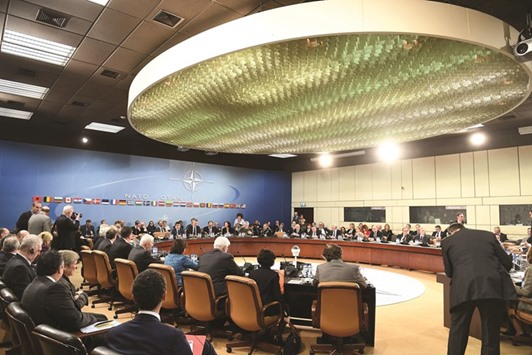Foreign Minister Sigmar Gabriel said it was neither “reachable nor desirable” for Germany to spend the agreed Nato target of 2% of member states’ economic output on defence.
Nato allies have until 2024 to do that.
“Two per cent would mean military expenses of some €70bn. I don’t know any German politician who would claim that is reachable nor desirable,” Gabriel told the first meeting of Nato foreign ministers attended by Tillerson.
“The United States will realise it is better to talk about better spending instead of more spending,” he said, noting that humanitarian, development and economic aid to stabilise countries and regions should also count.
Tillerson said allies will need to pay up or outline plans for meeting that target when Nato leaders meet on May 25 for the first top-level summit of the alliance to be attended by US President Donald Trump.
Trump has criticised the North Atlantic Treaty Organisation (Nato) as “obsolete” and suggested Washington’s security guarantees for European allies could be conditional on them spending more on their own defence.
He has also said he wants Nato to do more to fight terrorism.
“Our goal should be to agree at the May leaders meeting that by the end of the year all allies will have either met the pledge guidelines or will have developed plans that clearly articulate how ... the pledge will be fulfilled,” Tillerson said. “Allies must demonstrate by their actions that they share US government’s commitment.”
In Berlin, German government spokesman, Steffen Seibert, said that the government was committed to increasing defence spending and would continue to do so “because we know it is necessary and makes sense to further strengthen our armed forces”.
US defence expenditure makes up about 70% of the total Nato allies’ defence spending.
Only four European Nato members – Estonia, Greece, Poland and Britain – meet the 2% target.
Nato head Jens Stoltenberg rejected Gabriel’s call to include non-military spending towards the goal, but said Germany was moving “in the right direction” with more military spending after years of cuts.
He said yesterday that Nato ministers discussed national plans for arriving at the target as they prepared for the May summit.
In London, Britain’s Defence Secretary Michael Fallon said that other European Nato allies must “raise their game, and those failing to meet the two-percent commitment ... should at least agree to year-on-year real terms increases”.
Tillerson did however offer assurances of Washington’s commitment to Nato during his brief stop in Brussels, although US officials said the US secretary of state did not have time for one-on-one meetings, which are customary during such gatherings.
His initial decision to skip his first meeting with Nato foreign ministers had added to questions about the Trump administration’s commitment.
The meeting was later rescheduled and he attended yesterday.
“The United States is committed to ensuring Nato has the capabilities to support our collective defence,” Tillerson said. “We will uphold the agreements we have made to defend our allies.”
Tillerson said that Nato was fundamental to countering Russian aggression in Ukraine.
A meeting on Thursday between ambassadors from Nato and Russia called on Moscow to do more to rein in the Moscow-allied separatists battling Kiev’s forces there.
Stoltenberg said ties between European Nato members and the United States were “rock solid”.
He said “fair burden sharing to keep the trans-Atlantic bond strong” and “stepping up Nato efforts to project stability and fight terrorism” were on the agenda yesterday as the bloc seeks to respond to the new, harsher tone from across the Atlantic.

